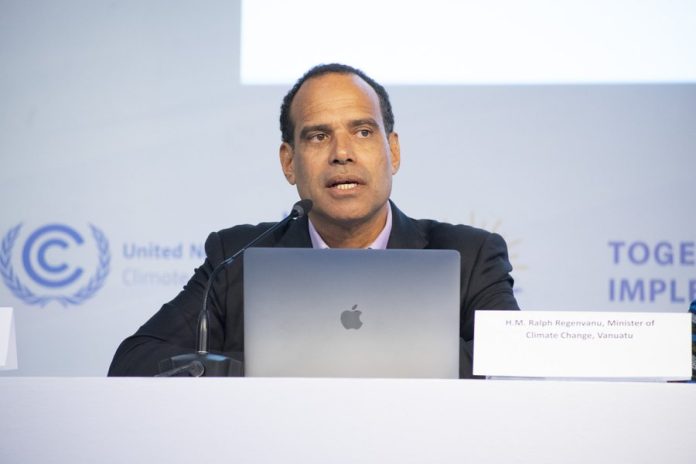By Anita Roberts
Vanuatu and its coalition partners for the International Court of Justice Advisory Opinion (ICJAO) resolution are confident of reaching the required number of votes at the United Nations General Assembly (UNGA).
This was conveyed by the Minister of Climate Change, Ralph Regenvanu, during a press conference at COP27 Climate Change Summit in Egypt.
The ICJAO resolution is expected to be tabled at the UNGA mid-December or early next year. A decision will be adopted by a simple majority, which requires a vote from half of the UN members.
To date, the ICJAO resolution has gained support from over 86 nations and over 1,500 non-government organisations.
Minister Regenvanu announced that the 18 members of the Core Group of Champions will move into the critical phase of UNGA negotiations starting this week.
“Our group of 18 nations has nearly finalized the draft, which will be shared to all UN member states and the public when we return home from COP27,” he said.
“Over the next three weeks, there will be open and inclusive consultation on the language, to ensure that all countries have the option to provide feedback and suggestions before going to a vote at the UNGA, Wherein a simple majority vote is required to pass and send our question to the ICJ.
“We are confident of reaching the requisite number of votes, what nation would oppose a resolution asking for clarity and guidance on how to protect human rights from climate change?”
Minister Regenvanu explained that this is not a court case to shame or blame any state but what Vanuatu and its coalition partners are simply asking for clarity to help everyone do better than now.
“The climate crisis is not just about managing tons of carbon or Degrees Celsius. It is about addressing intergeneration equity, and protecting the fundamental human rights of our people, who are now losing livelihoods and lives across the world,” he stressed.
“States have already collectively agreed to and ratified a range of International Treaties and Conventions which contain protections for women, children, the environment and human rights, all of which are now being significantly harmed by historical and growing emissions.
“We are convinced that if we were to have clarity on existing legal obligations to prevent harm, and better understand the legal consequences of enabling that climate harm, States would do a much better job of preventing, avoiding and addressing it.
“What we have seen this week is that negotiations are not working for the most vulnerable, largely because it is not clear what our obligations to each other, and to our people.
“An Advisory Opinion from the ICJ will significantly support climate negotiations both in general and in the present juncture of such negotiations
“It would foster ambition in the actions taken by States, which is crucial for the success of the process set in motion by the Paris Agreement.”
On implementation, the Minister said the need to authoritatively reaffirm that decarbonising is not a matter of discretion under the UNFCCC and the Paris Agreement but one of diligence is particularly pressing in the context created by the war in Ukraine.
“Oil and gas prices are artificially high and that is in turn buoying investment in upstream oil and gas, locking in emissions in the future. 1.5 is a redline for humanity, and the AO will help states understand their international legal obligations to accelerate the decarbonisation pathway rather than by increasing supply of coal, oil and gas,” he said.
“On climate finance, an ICJ advisory opinion would support climate negotiations by considering Parties’ finance obligations contained in the UNFCCC and reaffirmed in the Paris Agreement and placing these obligations in the broader context of international law, including in connection with States’ obligations to respect and ensure the right to self-determination.
“But most importantly, this Advisory Opinion will help States understand how they can apply human rights obligations and protections to strengthening domestic policy and legislation on climate action. We put people, communities and future generations at the heart and center of our State action,” he said.
SOURCE: VANUATU DAILY POST/PACNEWS














